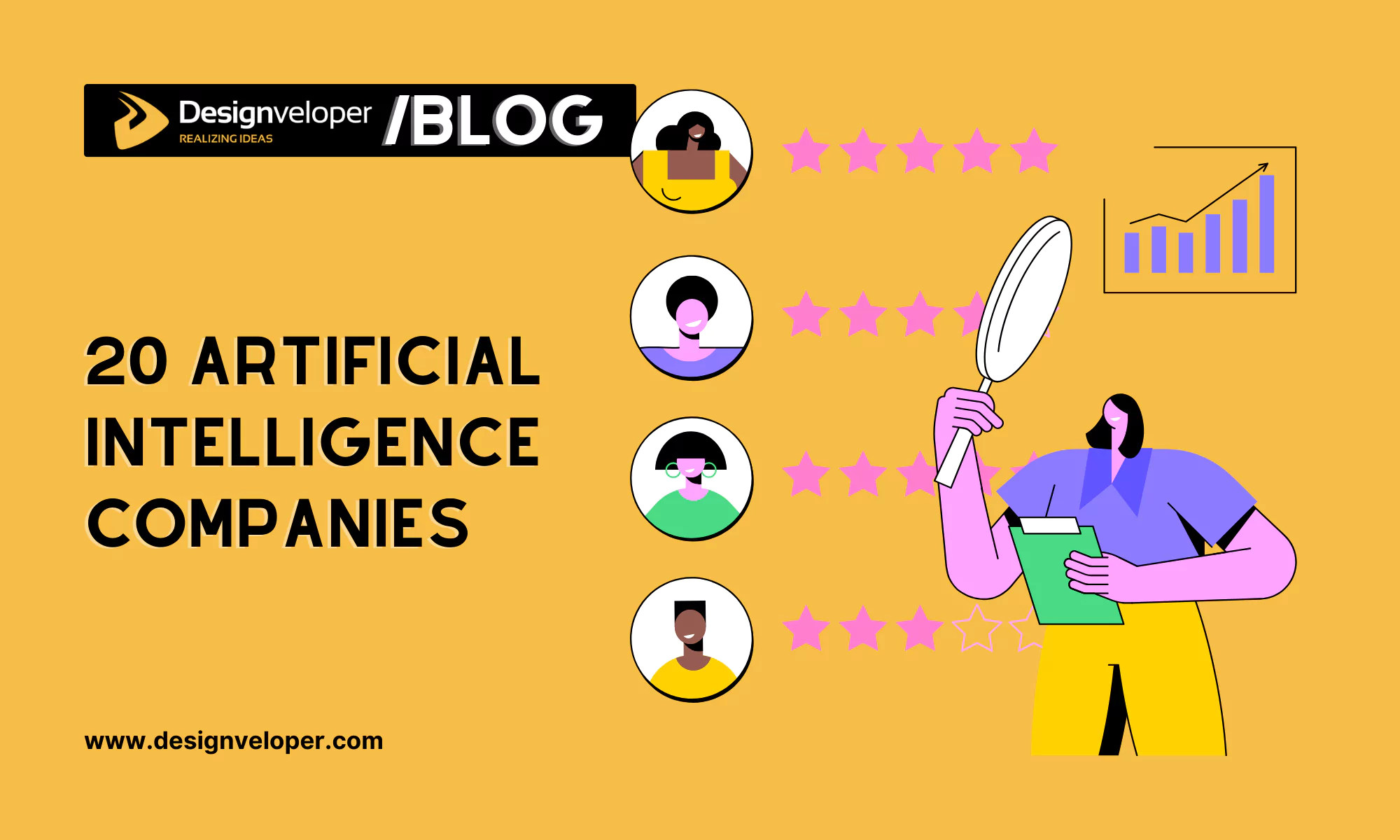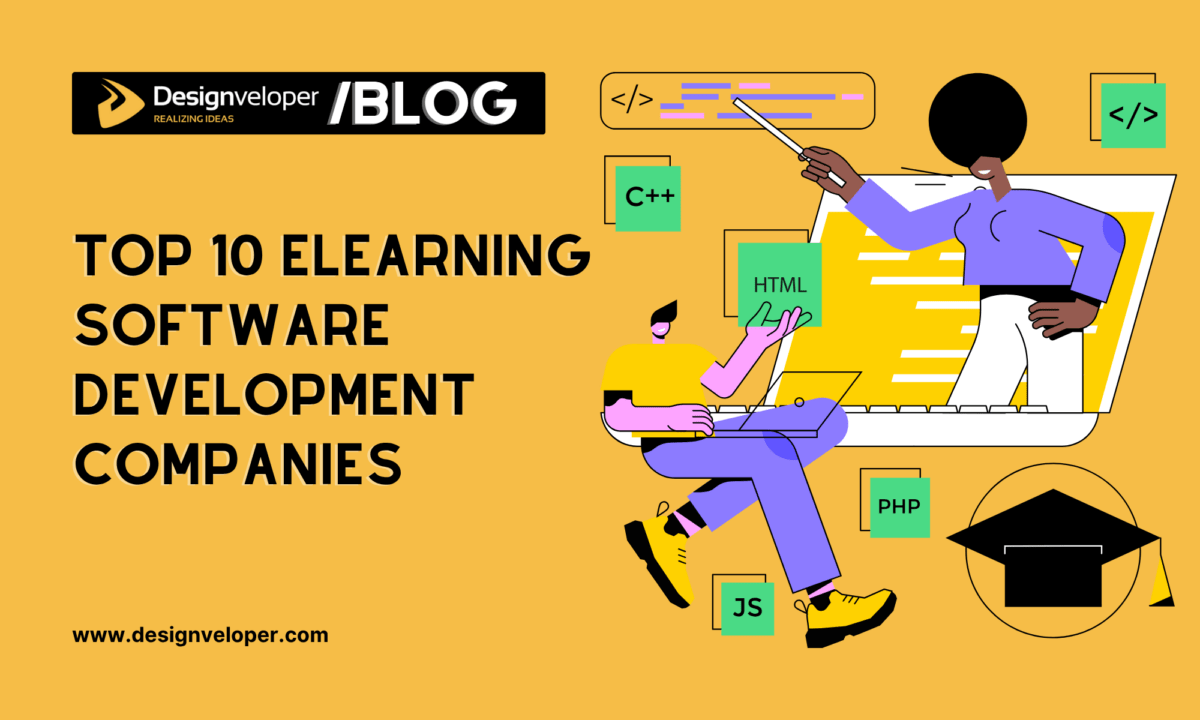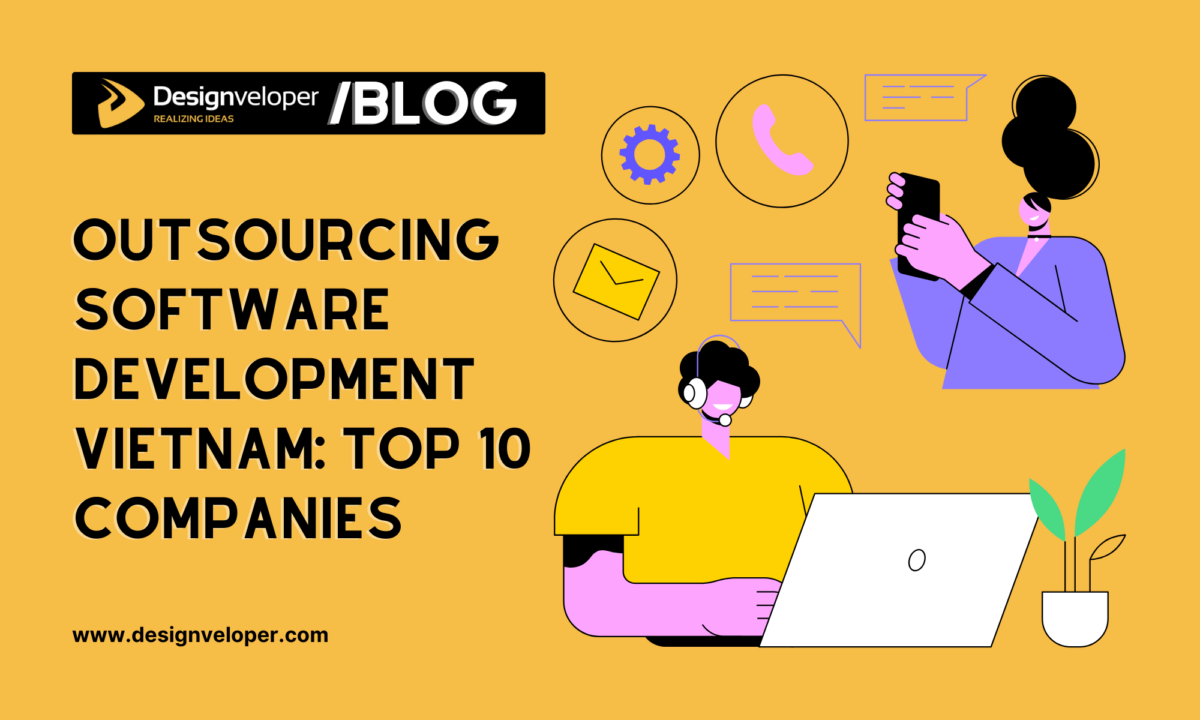
Artificial intelligence is the newest trend in a lot of fields, and companies that follow it are doing well. AI is becoming more and more common in our lives, from customer service reps to medical diagnosticians.
AI has already changed how we work, live, buy things, and even interact with each other. It will keep getting bigger over time. So how can you stay ahead of the curve? Check out these 20 AI companies that are leading the way in all kinds of AI.
What Is AI?
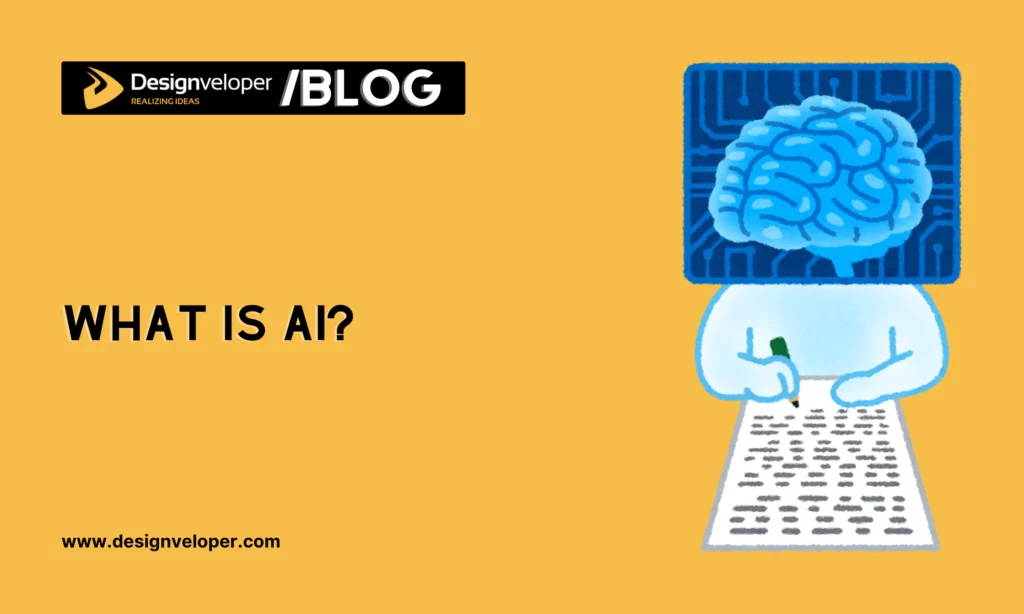
Artificial Intelligence is the idea of making computers think and act like human brains without any help from a person.
AI comes into different sub-categories like machine learning, natural language processing, or computer vision. These advanced technologies can help computers self-learn based on programmed instructions and inputs they’re given.
For this reason, they can handle repetitive tasks with high accuracy and speed that far surpasses our capabilities, hence supporting informed decision-making.
AI is rapidly transforming our world in different ways. One typical example is Apple’s Siri. This assistant uses AI algorithms to recognize your voice, understand and answer your queries, control home devices, and more. Besides, you can find other AI real-world examples in autonomous vehicles, eCommerce websites, and more.
Song Nhi: An AI-Powered Chatbot for Financial Management
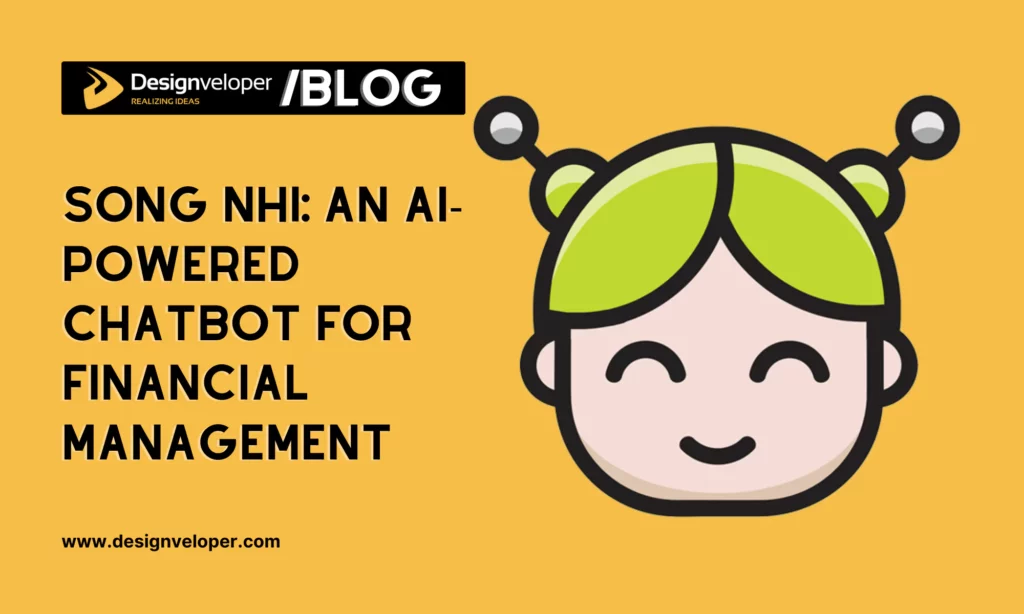
Song Nhi is an intelligent assistant developed by Designveloper to help people manage their finances.
We realized that people are confronting a fast-paced life. They’re also too busy to control their daily spending and personal finances.
While spreadsheets and other account software are cumbersome, mobile devices are becoming increasingly popular with 7.49 billion users projected in 2025.
Coupled with our demand for leveraging tech to empower people, we created Song Nhi to simplify their financial lives.
Song Nhi goes beyond a conventional budgeting app. We utilized cutting-edge techs like AI, NLP, and ORC to boost financial management activities. Here’s how:
- Natural Language Processing (NLP): Song Nhi can understand your voice or text-based requests in plain English and Vietnamese. Just chat via the Song Nhi app or messenger and let the assistant do the rest. For example, you can say something like “Breakfast $10” and Song Nhi will note it down. You can freely change tags and categories to the item.
- Data Analytics & Insights: The assistant uses AI to produce a visual representation of your income streams and spending habits. This allows you to identify where to improve and modify finances.
- Financial Advise: Song Nhi can analyze your income and spending patterns using AI capabilities. It then can provide personalized advice on saving strategies, potential investment opportunities, and debt repayment plans.
- Low Budget Warning: Song Nhi keeps a watchful eye on your spending habits in real-time. It then will send timely alerts when you’re at risk of exceeding your budget. This allows you to make adjustments and avoid inessential spending.
- Partners Sharing: If you upgrade your plan to Family Profile, you can share all income, expenses, and even financial freedom goals with your partners.
AI Advancements & Trends
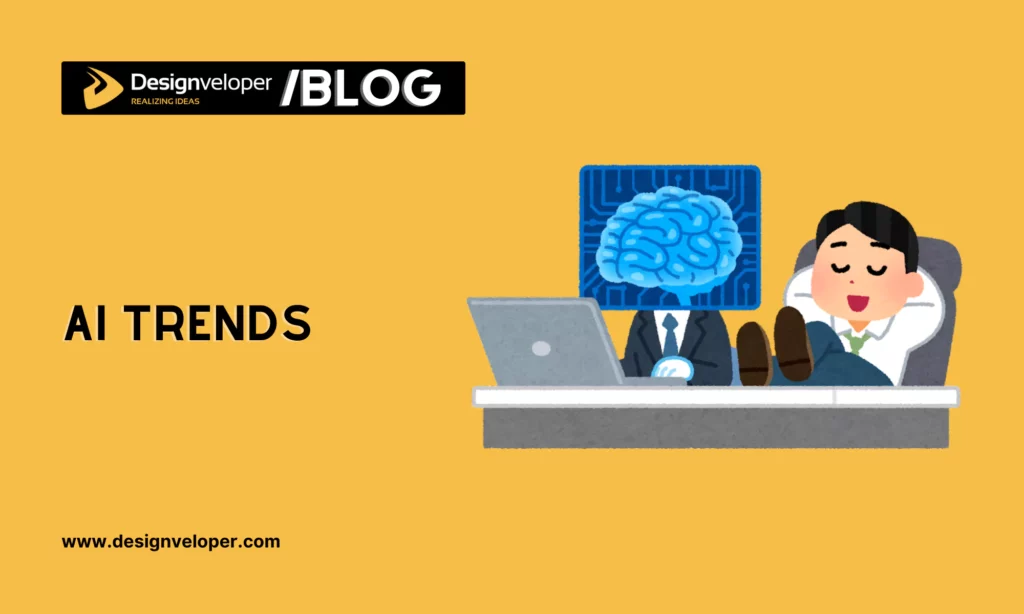
The artificial intelligence market is exponentially growing at a staggering CAGR of 36.8% during the projection period 2023-2030. Accordingly, the revenue is estimated to achieve USD 1,345.2 billion by 2030.
Coupled with this development are the key advancements and trends in AI:
- Generative AI: This modern version of AI has begun taking root in multiple industries, especially for content creation. Also according to Salesforce, 75% leverage GenAI for task automation and work communications. Even in software development, GenAI models like Github Copilot support developers in code suggestion and completion. Therefore, 2024 has seen an explosion of more open-source GenAI models like Gemini or ChatGPT.
- Federated Learning: Training AI models traditionally needs to centralize large amounts of data. This can lead to privacy concerns because of ownership issues or data security regulations. Therefore, federated learning helps train these models on data from multiple devices and servers. For this reason, you can remove the need to gather all data in one place and protect sensitive information (like medical records).
- Explainable AI (XAI) Methods: In the future, XAI will be used to make AI-powered decision-making more transparent and compatible with other systems. To achieve this, XAI detects which data points exert the largest impact on the AI’s decision and which changes to inputs can create a different outcome. Therefore, we can better understand the model’s logic and reasoning.
- Edge AI: This concept involves running AI algorithms directly on devices themselves (e.g., smartphones) rather than sending data to a cloud server. By processing data locally, AI allows real-time decision-making without the delays of sending data back and forth to the cloud. Also, it improves privacy concerns, reduces bandwidth usage, and enables offline functionality.
Recommended reading: 5 Common Myths of Artificial Intelligence
Top Artificial Intelligence Companies That Are Riding the Wave of AI
Because there is more demand for AI stocks, some companies are spending time and money to find out what they can do. Check out this list of digital giants who are leading the way in this new age of technology:
1. NVIDIA Corp.

NVIDIA’s headquartered in Santa Clara, California, United States
Artificial intelligence is already used in a huge number of fields, from business operations to self-driving cars. The difference between artificial intelligence today and tomorrow? NVIDIA’s artificial intelligence supercomputer is called Volta.
Simply put, Volta can handle a huge amount of data at once and do it quickly and accurately, much faster than the AI technology we use now. NVIDIA has filed for several AI patents, and its income from AI is growing quickly. Its AI platform, DGX Station, combines Volta-based hardware with a huge GPU computing cluster that needs two full-time operators and can handle more than 100 deep-learning AI tasks at once.
Recommended reading: 3 Methods of Using Artificial Intelligence in Educational Programs
2. Salesforce.com Inc.
Companies like Salesforce aren’t just using AI and machine learning in AI and machine learning. They are also using the technology in other ways. In fact, the cloud-based company recently announced that Amazon.com, Inc. would no longer be able to license its products, such as Service Cloud, Marketing Cloud, Marketing Cloud Predictive Insights, and Commerce Cloud (NASDAQ: AMZN ). Customers of these solutions will have to use Salesforce’s AI-powered platform, which the company is starting to build with Amazon’s Alexa service. This change will happen in 2019. Over the next five years, Salesforce plans to use more than 5,000 of its roughly 25,000 developers on the project.
3. Microsoft Corp.

Microsoft was started in 1975, and it has grown to be one of the biggest tech companies in the world. It is a big name in personal computers and made the widely used Windows software, is now using AI in cloud computing. As a result, the services business is doing well and is widely thought to be a driver of long-term growth. CEO Satya Nadella sees AI as a “polymath” that can “transform the productivity of every person on the planet.” The proof is in Microsoft’s Azure cloud-computing platform, where AI is driving the company’s fastest revenue growth in a decade. The other important thing to keep an eye on is how Microsoft gets along with its longtime rival, Apple Inc. (NASDAQ: AAPL). Apple’s hardware business, which needs a lot of cash, is putting pressure on the company, so it has made a new push into cloud services.
4. Alphabet Inc.
Google’s profits now depend just as much on AI as they do on its ads. Most of Alphabet’s income already comes from advertising, and its ability to learn useful information from users’ search queries, clicks, and videos has been a key factor in recent advertising growth.
To do this, Alphabet uses algorithms called machine learning to look at billions of pieces of data and find patterns. Sundar Pichai, Google’s CEO, says that’s one of the main reasons why Google now knows at least 1.7 trillion search results every day. Alphabet also used machine learning in its Google Assistant, which came out last year.
Google may not be the biggest company in the world, but their artificial intelligence (AI) cloud is very powerful, and they just released Google Brain. It is Google’s personal assistant that can follow your instructions and understand what you mean. Google Brain can also learn about things and how to do them. It can also understand how people talk to each other by processing language.
Google is putting a lot of money into building up its AI infrastructure, with a focus on algorithms and processing power. With its Drive API, Google Drive is the largest cloud-based AI library. It is a free, open-source service that lets users analyze their digital data by connecting to thousands of third-party apps.
Recommended reading: How Much Does Google Pay Their Software Engineers?
5. Apple Inc.
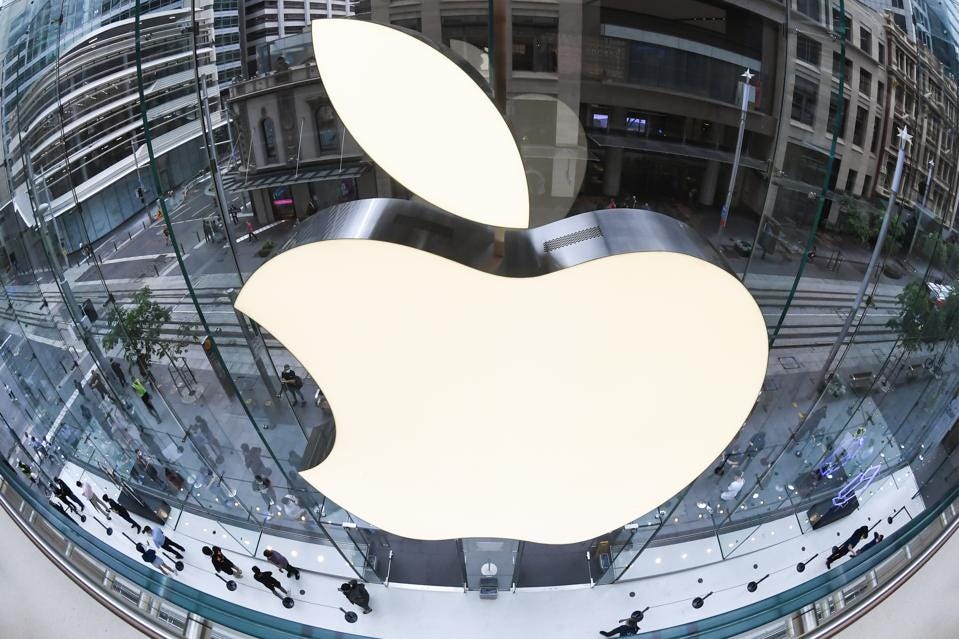
Apple is more aware of its customers’ tastes and lifestyles than anyone else.
Technology companies with mature businesses are more susceptible to shifting trends. Apple, one of the most mature and well-known tech stocks on Wall Street, is perhaps the most obvious example.
Back in the early 2000s, the iPhone was in its infancy, so the Apple ecosystem still was one with multiple pieces. By the time Apple developed its first AI-powered product, the company had become so focused on keeping customers coming back that it couldn’t afford to alienate them.
For Apple, the high-margin smartphone helped maintain demand for new generations of software and hardware, which in turn kept customers’ hardware-reliant handsets running longer. To some extent, iPhone saturation also created an inviolable moat for Apple.
Siri, the iPhone’s virtual assistant, was released by Apple in 2011. Since then, Apple has released the HomePod, their own smart speaker system, and the Apple Watch, a personal fitness tracker. They have also added AI to their Photos, Safari, Maps, Apple Music, Mail, Messages, and other apps.
Recommended reading: 3 Methods of Using Artificial Intelligence in Educational Programs
6. Facebook Inc.
Facebook’s huge, global social network is the main source of its billion-dollar profits and growth over many years.
In fact, about a quarter of the time the U.S. population spends online is on Facebook right now. And now that more than 2.2 billion people use the social media giant every day, it’s almost impossible to leave the social network.
So how can Facebook make money from all this user time, especially since YouTube is already blocking videos and Spotify is starting a music service? Using AI, you guessed it. There are a lot of new ideas in artificial intelligence right now. According to data from CB Insights, the total amount invested in AI grew by more than three times in 2017 to more than $80 billion.
7. Baidu Inc.
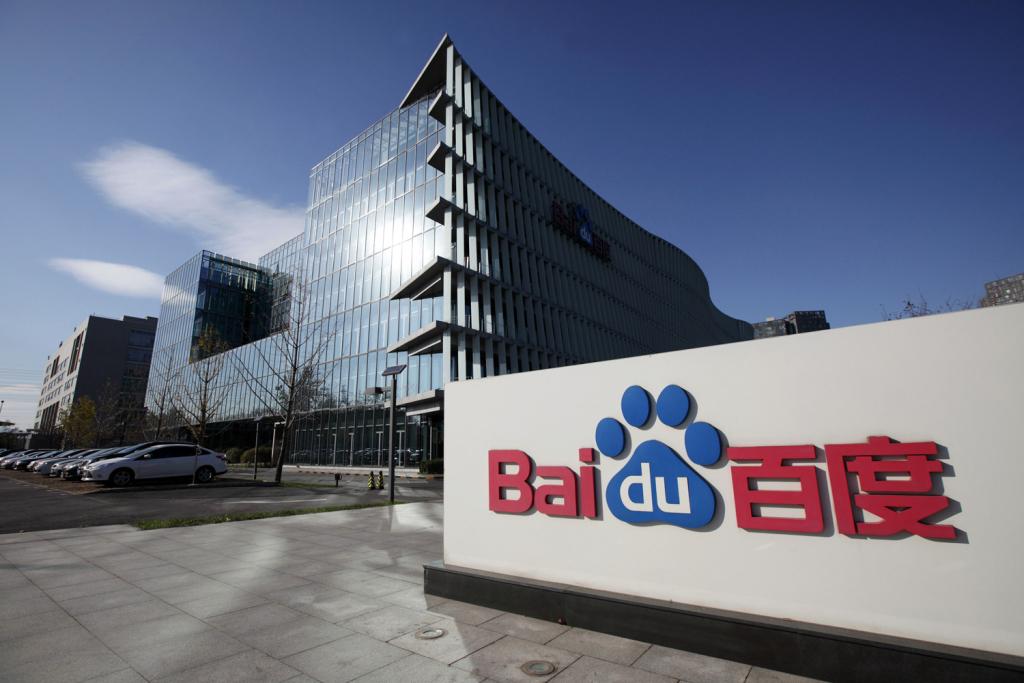
Baidu is committed to making the content discovery on the internet easier.
Many people think that Baidu Inc. (NASDAQ: BIDU) is China’s largest search engine. Baidu has 117.4 billion average monthly users, and more than half of them use a Baidu app. This number is growing.
But the Beijing-based search engine has put a lot of faith in AI. “Search is the first point of contact with users,” said Robin Li, CEO of Baidu. He also said that the current trend in the industry is to customize search results based on what the user has done in the past. “No matter how old or young you are, we can meet your needs.”
AI is used by more than just the Baidu search engine in China. Alibaba (NYSE: BABA) also has an AI-powered voice assistant in its mobile app. The main goal of all of these companies, though, is to meet the growing demand for customization among customers.
8. Cloudera Inc.
Even though Cloudera’s financial performance is not based on Artificial Intelligence, the company is still in this top list due to its predictive analytics platform called Movidius. The most important part of that platform is a small neuromorphic processor that is said to be able to process complex data like a human brain.
Still, the Movidius chip does not work like the brain. Instead, Movidius takes off-the-shelf parts and puts them together to do highly specialized tasks like computer vision and machine learning. Also, for something so small, the chip is very good at what it does.
9. Amazon Web Services

The company provides solutions that allow customers to build and manage scalable and cost-effective Artificial Intelligence infrastructures
Amazon’s (NASDAQ: AMZN) business in cloud computing is by far the biggest in the field. Its AWS is used for many things, but the best artificial intelligence technology for voice-controlled devices is built on it.
Some of the big uses of AWS are Amazon’s AWS ecosystem, Alexa, and devices that work with Alexa like Echo and Echo Dot. Also, Amazon’s Alexa is the best voice-controlled device on the market, and it has led to the creation of many AI-powered products like smart TVs, smart refrigerators, and more.
More AI-based improvements are on the way, but Alexa is different because it was built from the ground up to be controlled by voice.
10. Google Cloud Platform
Since 2011, when it made its deep learning neural network, Google has been the leader in AI. Deep learning uses many layers of artificial neural networks to process large amounts of information more efficiently than older systems.
The business has also put money into making neural networks. Neural networks could be used to make better autonomous driving and even cars that can drive themselves. Google has also made “smart devices” like Google Home and the Pixel line of smartphones. Facebook is now one of the leaders in artificial intelligence (AI) because of its work on a number of AI projects.
11. IBM
IBM is famous for its Artificial Intelligence (AI) Systems. These systems have helped business clients in important ways; meanwhile, Watson, AI, cognitive computing, and blockchain are on the verge of making more AI breakthroughs.
As a leader in artificial intelligence, the company has spent billions on research and development. This research is being used in important areas like data analytics, mobile analytics, and cognitive computing. For this reason, IBM has recorded a lot of progress in AI, such as with the IBM Watson platform.
12. Anduril Industries

The company called Anduril commits top technical talent to solve the most complex national security challenges
Ambiq is a platform that was made for this stealth startup. It’s an AI that works like Amazon’s Alexa. According to Anduril, Ambiq learns on its own, which lets it understand situations and intentions.
Ambiq can be programmed, so customers can tell it to follow a certain set of rules. These rules are called “wake-up procedures.” For example, if only one delivery person is available and a new order comes in. It may set up the system so that it can only make one delivery. Anduril thinks that its solution could be useful in retail, manufacturing, and real estate, among other fields. AgilOne AI Operations Center is the most important product from AgilOne. It uses real corporate data to automate responses to IT problems.
13. Sift Corp
Sift is the largest service for recommending people in the world. It creates and offers recommendations for a wide variety of things, such as what books to read next or which songs to download.
Its recommendation engine is based on “deep learning” and is linked to the Facebook accounts of its customers. It’s said that its recommendation engine looks at more than 100 signals, like links shared on social media, photos, and what friends like.
Through these suggestions, it can offer a service that is “better than humans at giving answers to complicated questions and making the right decisions for the right people at the right time.” Sift is a new company that was made possible in large part by the cloud.
14. Nauto
Nauto is well-known for its AI-based cognitive safety systems that are used to find distracted drivers and cut down on car accidents.
The company’s artificial intelligence can track how drivers’ eyes move, how their pupils dilate, how fast they drive, and how they drive. Because of this, this technology works with both in-car and cloud-based systems, such as Nvidia’s Drive PX 2. Jen-Hsun Huang, the founder and chief technology officer of Nvidia, said in a recent press release, “Nauto’s technology will help cars make better driving decisions in all kinds of driving conditions.”
Companies like Nvidia are adding new features to all kinds of cars to help them learn more about their passengers and protect them and the environment around them. Because of this, Nauto’s technology could be the first step toward this future.
15. OpenAI

OpenAI’s technology platform has many of the parts that are needed to make an AI system that works well. Using a teaching system called the “Human Intelligence Targeting Engine” (HITE), the team has built an AI system that is good at learning new skills and using them in new situations.
It is an AI system designed for research, and it was made with help from universities all over the US, from Stanford University to the University of California, Berkeley. On its website, OpenAI says that it is now trying to “solve AI safety.” The company that does research is looking into making safe AIs, including ones that could become conscious or wise. In fact, it made a made-up artificial intelligence system that can read more than 2,000 books.
16. Vicarious
Vicarious is an AI company based in San Francisco. It was founded in 2010 by Ph.D. physicists. The company works on general artificial intelligence (AI), and DARPA’s $40 million AI Challenge is one of its successes. Their system, called Perceptual Engine, is a highly developed neural network that can recognize images.
C23T C2Sight is a private Chinese company that makes software for analyzing large amounts of data, like facial recognition, search, audio recognition, visual recognition, and tracking of objects. AiFi was started in 2014 to connect companies with data and use AI to figure out what the data means. SCIE, which stands for Software for Sensor Imaging Intelligence, is the company’s product. It includes a set of open-source AI services that run in the cloud. Intellihub.
17. Ubiquity6
This is a group of 16 researchers from UC Berkeley, KDDI, and Uber working together. They work on the edge of computing to add intelligence to smart devices for the Internet of Things (IoT). Ubiquity6 also wants to make the edge smart by finding a way to use “natural language processing, computer vision, and classification methods to make the Internet of Things smarter.”
The Cloud, Hardware, and Software in Ubiquity6’s Connected Edge Platform make it possible for devices to securely talk to the edge and learn from the data they collect.
It uses this information in real-time to make intelligence that can be used, such as better indoor navigation and resource use, IoT energy management, and machine vision.
18. Baseten
Founded in 2019, Baseten is an infrastructure company that incorporates Artificial Intelligence into its business operations, processes, and production. Accordingly, the company builds a fast and scalable platform for deploying AI models in production.
Furthermore, it provides high-performance, secure, and dependable model inference services that align with the critical operational, legal, and strategic needs of enterprises. Therefore, its platform is trusted by top engineering and machine learning teams, accelerating time to market for companies scaling inference in production.
19. LangChain
Despite being founded in late 2022, LangChain still records itself as one of the top artificial intelligence companies in the world. The company provides a well-structured framework for developers to easily build LLM apps powered by large language models (LLMs). Accordingly, developers can easily incorporate such LLMs as Gemini or GPT-4 into their projects.
Furthermore, LangChain’s platform supports all stages of the development process, from ideation to finished deliverables and post-deployment. The tasks LangChain helps with are very similar to the general capabilities of LLMs themselves. These tasks include analyzing text documents, generating summaries, implementing code analysis, and building LLM-powered chatbots. This speeds up the time to market of software solutions while ensuring their high quality.
20. Unstructured
Unstructured is established in 2022 to support companies of all kinds with one frequent hurdle. That’s converting “unstructured data” (e.g., PDF files or documents) into a format that AI can easily understand and process.
To do so, the company develops an open-source platform that may preprocess data at scale for machine learning services. As such, it offers an easy way to turn natural language data into LLM-native format. For this reason, data scientists spend less time collecting and purifying data; this will give them more time for data modeling and analytics.
At the End of the Day
At the end of the day, those companies that work on artificial intelligence have a big effect on the world. So much so that many businesses are using this new technology. AI can do things automatically that used to be done by people. It can look at the information in ways that people can’t.
It also makes things like translations happen faster and more accurately than ever before. AI is also being used to make customer service more personal. Because of this, it could save both business owners and their customers a lot of time.






Read more topics




























